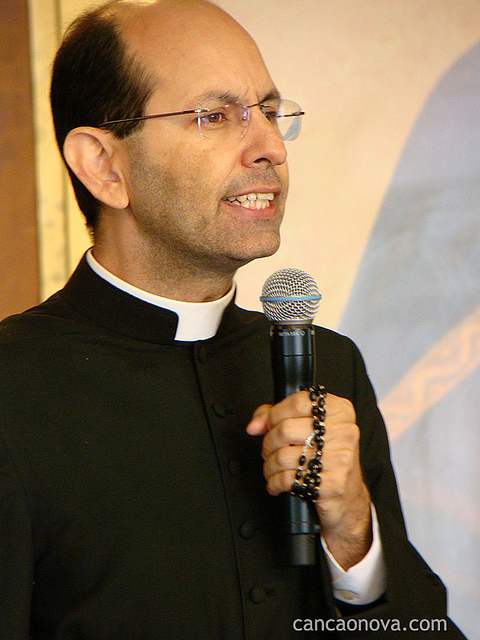This is the second except from a talk Fr. Paulo Ricardo Azevedo, Jr. proclaimed at Canção Nova. Here he discusses the mechanics of atheism and their affects–ed.
 A Crucifix on the wall is a religious attitude, but an empty wall and a city empty of Christian symbols is also a religious attitude because the people manifests that they do not have God. If you remove Crucifixes from you walls, and replace them with logos and marketing and store symbols, symbols of consumerism this too is a religion.
A Crucifix on the wall is a religious attitude, but an empty wall and a city empty of Christian symbols is also a religious attitude because the people manifests that they do not have God. If you remove Crucifixes from you walls, and replace them with logos and marketing and store symbols, symbols of consumerism this too is a religion.
If a martian were to come to the planet Earth and seek to find what is the religion of this people. He would say: “This people should have a god and should spend, invest, donate in order to create the greatest monuments, buildings, the most chic of monuments that which has the greatest investment is where you will find the god of this society. Certainly, the martian will come to the conclusion that the god lives in shopping centers or banks for they present themselves as the most chic. What we have as the most comfortable, the most beautiful is where our god is.
Our churches, they are condemned to be in small hovels, a little box with a cross on top. Where is our God, my brothers and sisters. This is our society and this is what we are building with our atheist thought. Now this is our faith and this is what it provides.
There was an atheist philosopher named Jean-Paul Satre, French philosopher. In 1945, after the second world war, he held a conference. The name of the conference was Existentialism is Humanism. At the this conference he explained what his philosophy of existentialism is. He said this: “Existentialism is a philosophy that has its end to bring to the Earth those consequences or facts for him a fact . . . bring to the Earth the fact that God does not exist.” For him it was a fact: God does not exist. If God does not exist how do we define our behavior. Jean-Paul Satre was a rationalist of the ultimate type because his philosophy was called Existentialism. The opposite is what is called Essentialism. How serious is Essentialism?
I have made a book a bible like this. I have an idea of how this bible should be. I go to the printer and I pay for the bible that was printed and I find some defects. There are some typographical defects, because I can say that this bible has some defects. Since it was I who thought of the book, therefore I can compare my image of the bible with the real bible. See that the book existed in my head as an essence, afterwards, it existed in fact. I can go to the printer and I can say that it came out badly, because I thought of it before, I know how it should have come out. When you go to a clothing store to buy some clothes. You say that you want clothes, when they bring clothes to you, you can say “I do not know this type nor do I want it.” Because you can say that these clothes are wrong. You can say that because you first had an idea of the clothes. The essence of the clothes is in your head before it existed. When it begins to exist you can look at it and realize that you are in agreement or not with this project of the clothes.
You have your car. The mechanic knows the idea of a car, like the maker, he has an idea of the car. He can say that the car has a problem because he has an idea of what the car should be like. Things are clearly incorrect when I have an idea with which I can compare them. I have the model in my head and the real model and I can say if it is incorrect. Do you understand?
I can tell what is correct and what is incorrect.
I cannot tell what is correct or incorrect if I have nothing with which to compare. In order to compare something, I have to have a prototype. . .
I can do this with all the things that the human being creates, but not the human being.
If God does not exist, there is no one thought of the human being and if there is no one thought of the human being, there does not exist correct and error. Do you understand?
If God does not exist no one thought of the human being, we do not have a project. For these atheists, the human is the fruit of continual changes. As the Brazilian atheist poet says, I prefer a constant metamorphosis. What is this constant metamorphosis? He changes everyday. God did not think of me, and, therefore, I do not know what is correct or incorrect. This is what calls itself atheism.

